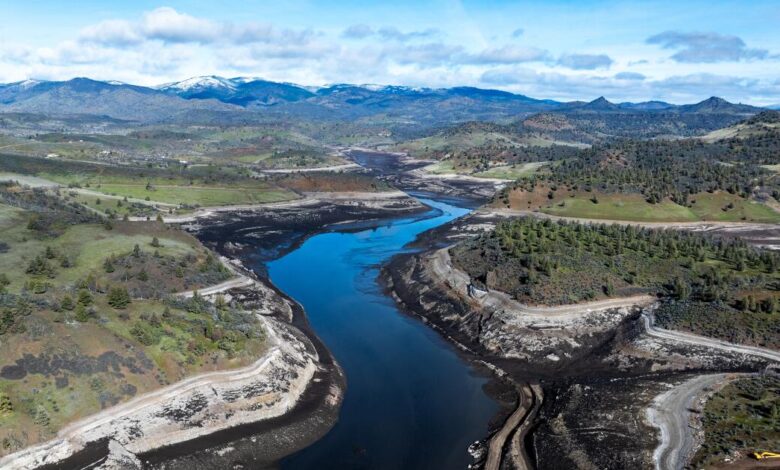Contributor: DOGE and Trump quash a Klamath River basin comeback

The Trump administration ruined what should have been a good spring in the Klamath River basin.
By abruptly laying off federal personnel and freezing payments for already authorized programs and projects, the administration replaced a budding sense of hopefulness in the basin with fear and uncertainty, and tore at fragile bonds years in the making among upper basin ranchers and farmers, federal, state and local governments, nonprofits and Native tribes. In a region where conflict over water has simmered for the last quarter-century, trust was already fragile. Now it is smashed to smithereens.
Through the 21st century the Klamath has lurched from crisis to crisis, usually related to the extended drought that has hovered over the basin most of that time. What distinguishes the current debacle is that it has no relation to natural phenomena. It’s entirely man-made — and entirely unnecessary.
Out of disregard for the needs of ordinary Americans and an apparent desire to eviscerate whatever was championed by his predecessor, Joe Biden, Trump has allowed Elon Musk to take a blunt hatchet to federal expenditures. The result in the Klamath — where voters overwhelmingly chose Trump in 2024 — is that many people feel fearful and betrayed.
Early last October, the world’s largest dam removal project, entailing the dismantling of four obsolescent Klamath River hydroelectric dams that had blocked salmon from the upper basin since 1918, was completed. More than 6,000 salmon — a number that far exceeded biologists’ predictions — swam upstream past the demolished dams over the next two months. Lower basin tribes, whose cultures and diets revolve around salmon, celebrated.
In conjunction with dam removal, tribes and government agencies launched programs to restore the environmentally ravaged river after a century of misguided federal water management. In the upper basin, where drought-induced water scarcity had led to scant allocations to farmers and ranchers, farmers got support from federal programs that promoted increased water efficiency and improved the river system’s dreadful water quality.
Many of the efforts were funded by the Biden administration’s 2021 Bipartisan Infrastructure Law. Typically, an environmental nonprofit or a local government body applied for funding to carry out, say, a wetlands restoration contract or upgrades to farmers’ irrigation equipment. When the work was completed, its federal backer was alerted, the funds were released, and the contractors paid and farmers reimbursed.
In a matter of days, Trump and Musk broke the system. Now the nonprofit or agency isn’t able to collect promised funds, and contractors and landowners are left with debts for labor or purchases they’ve paid for, in amounts up to hundreds of thousands of dollars. Some nonprofits are laying off workers and are wondering whether they will survive. Federal agencies’ staffs have been reduced, and some agencies may be forced to move out of the basin entirely.
Funding recipients usually found out about the cuts without a hint of warning. Larry Nicholson is executive director of the Upper Klamath Basin Ag Collaborative, a group of farmers, ranchers, government officials and scientists that has been planning the restoration of a key portion of the river. Having received a $6-million grant from the Bipartisan Infrastructure Law, the collaborative has carried out about 40% of planning for the project, but in February, Nicholson said his accountant called him to tell him that the federal government had stopped making deposits.
“I never got an email,” he said. “I never got a phone call. I never got any forewarning. Consequently, I have probably in excess of $250,000 in invoices for work that is already done that I can’t pay.”
Now the planning is shut down, and Nicholson isn’t sure it will continue. Little bombs of debt like this have been exploding all over the basin.
Another example: The Klamath is highly vulnerable to wildfire, and in 2021 it experienced the Bootleg fire, the nation’s largest wildfire that year. Yet Musk’s Department of Government Efficiency blithely laid off U.S. Forest Service workers who were thinning forests and reducing vegetation around homes and other structures. As a result, fire “hardening” in some areas has entirely stopped, and early-fire-detection procedures are weakened.
And this: Some federal funding for the basin’s tribes also has been frozen, leaving tribal leaders to wonder whether they will have to shut down crucial departments such as those that track and support salmon recovery.
The question remains: Why?
Whatever savings may be realized from firing federal workers and freezing funds will almost certainly be matched by the costs of abandoning projects before they’re completed, and by spreading so much uncertainty that local businesses, tribes and government agencies remain paralyzed. These cuts have nothing to do with rooting out fraud and waste, which cannot have been discovered by the DOGE slash-and-burn cost-cutters. As former Labor Department Inspector General Larry Turner said recently, a genuine investigation into federal fraud and waste takes about a year, not a few days.
Back on Feb. 28, Musk told Joe Rogan and his podcast listeners that “the fundamental weakness of Western civilization is empathy,” as if empathy were something else to root out, like river restoration programs. It’s an unusually revealing comment in the context of the Klamath, where the administration’s astonishing lack of empathy is now on garish display.
Jacques Leslie is the author of “Deep Water: The Epic Struggle Over Dams, Displaced People, and the Environment.” He is at work on a book on the Klamath basin.




